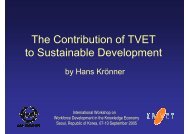Learning for Life, Work and the Future Initial ... - Unesco-Unevoc
Learning for Life, Work and the Future Initial ... - Unesco-Unevoc
Learning for Life, Work and the Future Initial ... - Unesco-Unevoc
Create successful ePaper yourself
Turn your PDF publications into a flip-book with our unique Google optimized e-Paper software.
<strong>Learning</strong> <strong>for</strong> <strong>Life</strong>, <strong>Work</strong> <strong>and</strong> <strong>the</strong> <strong>Future</strong> Participants’ Papers Page 71<br />
It is true that many beneficiaries of graduates have left<br />
training to <strong>the</strong> government. Industry in many countries<br />
is not concerned with <strong>the</strong> way government-owned<br />
institutions train <strong>the</strong>ir future employees. This trend has<br />
to change, as <strong>the</strong> end result is disastrous not only to<br />
industry, but to <strong>the</strong> nation concerned as well.<br />
10. Conclusion<br />
Access to TVET should be addressed. This is not easy<br />
in <strong>the</strong> African setting due to poor economies, but a start<br />
should be made. The idea of introducing distance<br />
learning where it is not already being practised should<br />
be discussed <strong>and</strong> implemented as soon as possible,<br />
since this method of training ensures a country access<br />
to TVET <strong>for</strong> its citizens.<br />
20 MUTASA, Justin M. (Zimbabwe): In<strong>for</strong>mal Sector Training in Africa<br />
The in<strong>for</strong>mal sector in Africa is characterised by unregulated<br />
small-scale activities in which <strong>the</strong> production<br />
process <strong>and</strong> technological base are rudimentary <strong>and</strong><br />
focused on self-employment. Most of <strong>the</strong> in<strong>for</strong>mal<br />
sector enterprises cater <strong>for</strong> <strong>the</strong> market in <strong>the</strong> lower<br />
income groups or economic social strata. There<strong>for</strong>e<br />
<strong>the</strong> in<strong>for</strong>mal sector has <strong>the</strong> potential to grow, since <strong>the</strong><br />
bulk of <strong>the</strong> population in Africa is in <strong>the</strong> low-income<br />
group.<br />
The current winds of change blowing across Africa are<br />
<strong>the</strong> economic structural adjustment programmes that<br />
have brought about trans<strong>for</strong>mations in both <strong>the</strong> public<br />
<strong>and</strong> private sectors of employment. Because of<br />
globalisation, most public <strong>and</strong> private sector companies<br />
in Africa are facing stiff competition from cheaper <strong>and</strong><br />
better quality products from Europe, South East Asia<br />
<strong>and</strong> America. There<strong>for</strong>e <strong>the</strong> companies are “downsizing”<br />
or “rightsizing” <strong>and</strong> focusing on <strong>the</strong>ir core<br />
business. The net result is that thous<strong>and</strong>s of workers<br />
are being retrenched from <strong>for</strong>mal employment as companies<br />
ab<strong>and</strong>on unprofitable ventures. Some companies<br />
that cannot survive competition close down completely<br />
<strong>and</strong> workers are retrenched from <strong>for</strong>mal<br />
employment <strong>and</strong> thrown into <strong>the</strong> in<strong>for</strong>mal sector without<br />
<strong>the</strong> relevant skills to survive.<br />
To make matters worse, some of <strong>the</strong> present training<br />
programmes in Africa have outlived <strong>the</strong>ir usefulness.<br />
Be<strong>for</strong>e <strong>and</strong> after independence, a lot of training was <strong>for</strong><br />
<strong>for</strong>mal sector employment. At times, <strong>the</strong> training <strong>and</strong><br />
curriculum developed was too academic, <strong>and</strong> ill-suited<br />
to <strong>the</strong> economic realities that exist in Africa today<br />
when <strong>the</strong> <strong>for</strong>mal sector is shrinking because of <strong>the</strong><br />
harsh macro-economic conditions <strong>and</strong> <strong>the</strong> unprecedented<br />
growth of unemployment. This has led to a<br />
mismatch in some of <strong>the</strong> training programmes because<br />
<strong>the</strong>y are no longer relevant to economic realities.<br />
As a result, almost all <strong>the</strong> school-leavers, <strong>and</strong> those<br />
being retrenched from <strong>the</strong> mines <strong>and</strong> from public <strong>and</strong><br />
private sector companies, need some reorientation of<br />
<strong>the</strong>ir skills to fit into <strong>the</strong> new in<strong>for</strong>mal sector environment,<br />
where survival is tougher because it does not<br />
offer high wages or comm<strong>and</strong> high prices <strong>for</strong> its goods.<br />
There<strong>for</strong>e <strong>the</strong>re is a real need to train <strong>the</strong>se people <strong>for</strong> a<br />
“soft l<strong>and</strong>ing” in in<strong>for</strong>mal sector business.<br />
The in<strong>for</strong>mal sector is now <strong>the</strong> biggest employer of<br />
labour in Africa. In some cases it employs up to 60%<br />
of <strong>the</strong> total urban employment population. In Tanzania<br />
this figure is 53%, in Madagascar 56% <strong>and</strong> in Zimbabwe<br />
more than 53%. There<strong>for</strong>e, what is good <strong>for</strong> <strong>the</strong><br />
in<strong>for</strong>mal sector is good <strong>for</strong> <strong>the</strong> economies of African<br />
states, since <strong>the</strong> in<strong>for</strong>mal sector is now making a<br />
significant contribution to <strong>the</strong> Gross Domestic Product.<br />
In some African countries, like Zimbabwe, Nigeria,<br />
South Africa, Malawi <strong>and</strong> Cape Verde, partnerships<br />
have been <strong>for</strong>med between <strong>the</strong> host government <strong>and</strong><br />
donors in order to streng<strong>the</strong>n vocational training<br />
centres, <strong>and</strong> o<strong>the</strong>r public technical training colleges are<br />
offering courses in carpentry <strong>and</strong> wood technology,<br />
welding, metal fabrication, motor mechanics, radio<br />
repair, garment-making, bookkeeping, entrepreneurship<br />
skills <strong>and</strong> business development skills. The<br />
objective of <strong>the</strong>se courses is to link school-leavers <strong>and</strong><br />
retrenchees to job creation so that <strong>the</strong>y can set up <strong>and</strong><br />
sustain <strong>the</strong>ir own micro <strong>and</strong> small-scale businesses in<br />
<strong>the</strong> in<strong>for</strong>mal sector.<br />
Successful partnerships between <strong>the</strong> host African<br />
government, <strong>the</strong> donor <strong>and</strong> <strong>the</strong> local communities have<br />
shown that <strong>the</strong> in<strong>for</strong>mal sector can play a pivotal role<br />
in <strong>the</strong> economic <strong>and</strong> social development of African<br />
states by skills training <strong>for</strong> self-employment <strong>and</strong> selfreliance.<br />
Apart from partnerships <strong>and</strong> capacity-building between<br />
host African governments, donors <strong>and</strong> local grassroots,<br />
o<strong>the</strong>r strategies that can be used <strong>for</strong> <strong>the</strong> success of<br />
in<strong>for</strong>mal sector business are <strong>the</strong> integrated approach,<br />
training where <strong>the</strong> people live, trade testing <strong>and</strong> skills<br />
upgrading, sustainable in<strong>for</strong>mal sector training, <strong>and</strong><br />
government legislation to collect a training levy from<br />
eligible companies in both public <strong>and</strong> private sectors.<br />
The government training levy is very effective,<br />
especially after “donor fatigue”, when funds have dried<br />
up <strong>and</strong> <strong>the</strong> donor has pulled out of <strong>the</strong> partnership. The<br />
Zimbabwe Manpower Development Fund (ZIMDEF)<br />
is now a key stakeholder in Vocational Training in<br />
Zimbabwe <strong>and</strong>, in Malawi, <strong>the</strong> Industrial Training<br />
Fund oversees <strong>the</strong> relevance of courses offered by<br />
technical colleges, <strong>and</strong> administers <strong>the</strong> levy collected<br />
from eligible employers. In Nigeria, <strong>the</strong> Industrial





